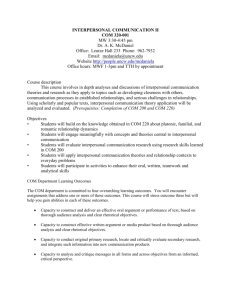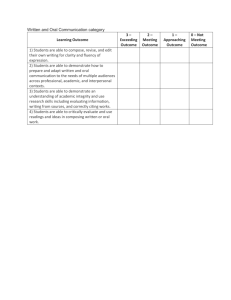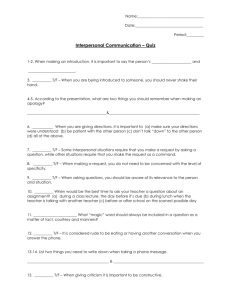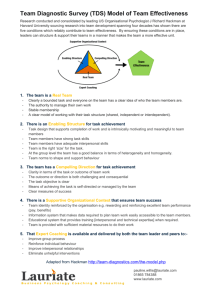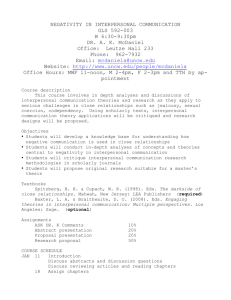interpersonal communication
advertisement
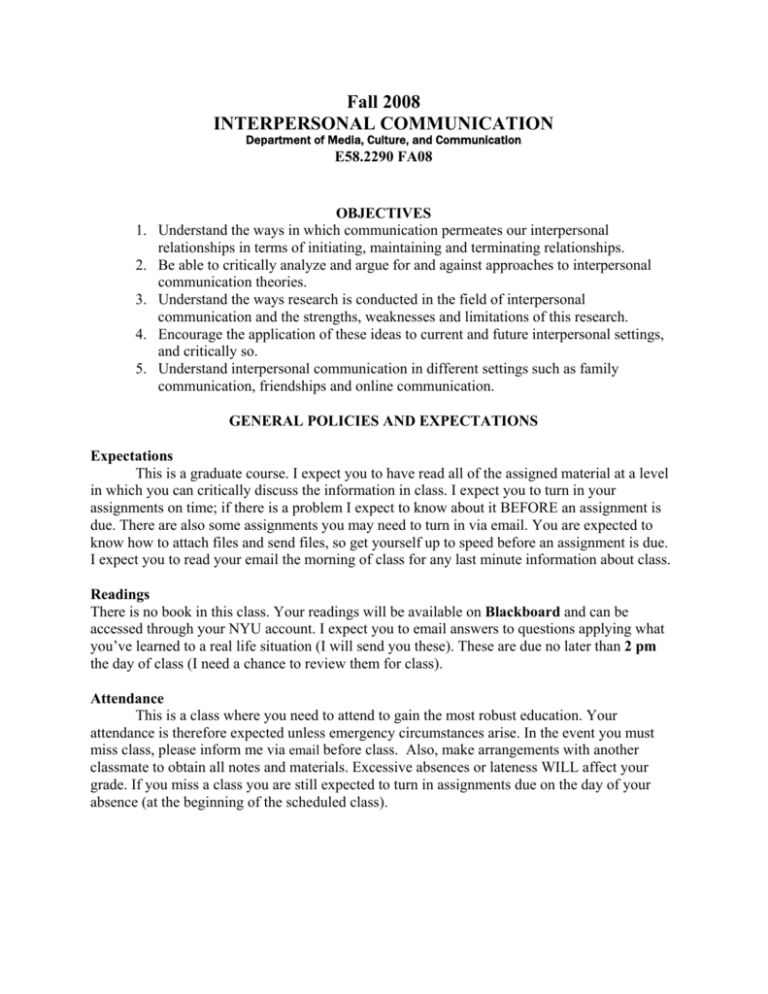
Fall 2008 INTERPERSONAL COMMUNICATION Department of Media, Culture, and Communication E58.2290 FA08 OBJECTIVES 1. Understand the ways in which communication permeates our interpersonal relationships in terms of initiating, maintaining and terminating relationships. 2. Be able to critically analyze and argue for and against approaches to interpersonal communication theories. 3. Understand the ways research is conducted in the field of interpersonal communication and the strengths, weaknesses and limitations of this research. 4. Encourage the application of these ideas to current and future interpersonal settings, and critically so. 5. Understand interpersonal communication in different settings such as family communication, friendships and online communication. GENERAL POLICIES AND EXPECTATIONS Expectations This is a graduate course. I expect you to have read all of the assigned material at a level in which you can critically discuss the information in class. I expect you to turn in your assignments on time; if there is a problem I expect to know about it BEFORE an assignment is due. There are also some assignments you may need to turn in via email. You are expected to know how to attach files and send files, so get yourself up to speed before an assignment is due. I expect you to read your email the morning of class for any last minute information about class. Readings There is no book in this class. Your readings will be available on Blackboard and can be accessed through your NYU account. I expect you to email answers to questions applying what you’ve learned to a real life situation (I will send you these). These are due no later than 2 pm the day of class (I need a chance to review them for class). Attendance This is a class where you need to attend to gain the most robust education. Your attendance is therefore expected unless emergency circumstances arise. In the event you must miss class, please inform me via email before class. Also, make arrangements with another classmate to obtain all notes and materials. Excessive absences or lateness WILL affect your grade. If you miss a class you are still expected to turn in assignments due on the day of your absence (at the beginning of the scheduled class). Privacy Students may at times reveal personal information about themselves as they encounter course materials and experiences. We all have a right to our privacy so any personal disclosures willingly made by those during the course (in writings, class discussions, etc.) should be treated with respect and in confidence. Assignments for this course are structured so that no disclosure of personal information need occur. Reasonable Accommodation Policy If you have a disability that affects your performance in this course, please notify me at the beginning of the semester and necessary special arrangements can me made to accommodate you. Any student attending NYU who needs an accommodation due to a chronic, psychological, visual, mobility and/or learning disability, or is Deaf or Hard of Hearing should register with the Moses Center for Students with Disabilities at 212 998-4980, 240 Greene Street, www.nyu.edu/csd. Academic Integrity Please read the Department’s Statement on Academic Integrity and abide by its principles. “Academic integrity is the guiding principle for all that you do, from taking exams, making oral presentations to writing term papers. It requires that you recognize and acknowledge information derived from others, and take credit only for ideas and work that are yours.” From http://steinhardt.nyu.edu/dcc/undergraduate/Statement_On_Academic_Integrity.php Criteria for Evaluating Papers This is a graduate class, and the expectations are higher. If you fulfill all the requirements of an assignment, expect a C grade. That is “average,”—what I expect all students to be able to achieve. I expect A and B students to go beyond the assignment requirements. Any paper not meeting graduate level standards will be returned un-graded. These include: 1. Level of depth of understanding of the scope, purpose, and central features of the theory or research employed. 2. Level of ability to recognize and analyze how concepts from the course apply. 3. Level of ability to recognize strengths and weaknesses in the theory or research employed. 4. Level of clarity in expression and organization, and of care in presentation 5. Papers free of technical errors, spelling errors and employing APA guidelines for format, citations, references, etc. B- = 80-83 Grading Scale: A = 94-100 C+ = 77-79 A- = 90-93 C = 74-76 B+ = 87-89 C- = 70-73 B = 84-86 You will probably find me a hard yet fair professor. Students receiving an A will definitely feel like they earned it. I feel strongly about properly preparing you for life after graduate school. As such, I will constantly strive to treat you with the utmost professionalism, respect and integrity, and expect the same from you. ASSIGNMENTS (Details available on Blackboard) Lay Theories Paper An introductory paper that is designed to help you explore how you think about your communication in your own personal relationships. It also gives me a baseline reading of your writing proficiency which we can work on throughout the semester. Movie and Theory Paper A paper that applies Interpersonal Theories you are learning in this class to a relational situation in the media. You will watch either a movie (or read a book if you prefer) that has a noteworthy interpersonal relationship and analyze the relationship based on one of the theories we have discussed. You will be expected to research sources outside your class readings for this assignment. Presentation This presentation requires you to do in-depth readings in an area of Interpersonal Communication not covered in class and present them to your peers. You will be required to choose a topic, research articles and choose readings for the class, summarize and synthesize the information in the area and present it to the class in a 25 minute (per person if working in groups) Power Point Presentation. Interpersonal Communication Paper This assignment requires that you go outside course readings and expand upon one of the interpersonal topics covered in class and apply it to a real life setting. A literature review (13 sources), along with a critique of the research, application to life and a future research agenda are required. (You can do a pilot research study that could be part of your Thesis if you wish.) This paper should be at minimum 12 pages (15 pages max). Final Exam The final exam will require that you be able to synthesize and integrate information you have learned. It will be take-home and due the scheduled time of the final exam. Participation Participation will based on: 1) The questions/answers that you submit for discussion; 2) Your participation in class discussion, (including actively listening to your fellow students and reacting to their thoughts as well as being attentive to peer presentations); 3) Your attendance (including being on time). Class participation does not involve me actively calling on you to participate but being a good communicator, responding to other people’s comments, being a good listener and an active participant in the course. (NOTE: If you are high in communication apprehension or feel uncomfortable talking in class, let me know—we can work something out—don’t let feeling uncomfortable jeopardize your grade). Grading Breakdown Lay Theories Paper Movies & Theory Presentation 5% 15% 20% Interpersonal Communication Paper 25% Participation 15% Final Exam 20% 4 INTERPERSONAL COMMUNICATION SCHEDULE* Readings are on Blackboard and will be available the week before the class unless otherwise requested. Week TOPIC DUE 1 9-03-06 Introduction to Interpersonal Communication 2 9-10-06 Interpersonal Communication: Basic Concepts 3 9-17-06 Interpersonal Theories- Part 1 4 9-24-06 Interpersonal Theories- Part 2 5 10-1-06 Methodology 6 10-8-06 Relational Development, Maintenance and Disengagementt 7 10-15-06 Relational Development, Maintenance and Disengagementt 8 10-22-06 Gender 9 10-29-06 Marriage/Divorce 10 11-5-06 Friendships 11 11-12-06 Family Communication 12 11-19-06 Technology 11-26 -06 NO CLASSS 13 12-4-06 Technology 14 12-10-06 Wrap Up 15 12-17-06 Final Lay Theories Paper DUE Movie and Theory TOPIC DUE Movie and Theory PAPER DUE IC Paper TOPIC DUE Presentation IC Paper ABSTRACTS DUE Presentation Presentation Presentation Presentation Final Paper DUE Presentation Final Exam due by 5pm 5 LAY THEORIES OF INTERPERSONAL COMMUNICATION DUE DATE: 9-10-06 INSTRUCTIONS: Please think carefully about the questions below. Write 2 or 3 paragraphs for EACH question. There are no right or wrong answers. Feel free to reference your own experience or what you’ve learned from others to support your answers. (Also remember that you are not required to reveal any personal information about yourself on this (or any) assignment.) OBJECTIVES: For YOU: To give you an opportunity to explore some of interpersonal beliefs you hold. We will cover these issues in class so you can compare your thoughts now to when the semester is over. For ME: To get an idea of your writing style and ways in which I can aid in the development of a clear and concise style. Therefore, take time to generate your ideas, articulate them, edit them, and polish them. Even though it’s a paper about your opinions, I expect graduate student quality writing. QUESTIONS 1. Has it been your experience that “opposites attract” in romantic relationships or “birds of a feather, flock together”? Discuss why you believe the way you do. 2. Support or refute the following statement: “In the long run, your independence and selfreliance as an individual is the most important thing you have, and you should never surrender this in a relationship with another person.” 3. Some research notes five different kinds of love: passionate love (eros), game-playing love (ludus), companion/friend (storge), pragmatic love (pragma), and altruistic love (agape). Discuss which you find to be the most rewarding and give the reasons for your answer. 4. Discuss how technology (e.g., cell phones, email, text messaging, etc.) has changed the nature of relationships for the positive and negative? 5. Do you mostly have friends of the same gender or of the opposite gender? Are the relationships you have different depending on the person’s gender? How? (Note: This assumes heterosexuality is your preference. If not, feel free to expound based on your situation.) 6 MOVIE AND THEORY PAPER Topic Due: 10-1-06 Paper Due: 10-8-06 Watch one of the following movies (or any other movie that you pre-approve with me) that have situations that could be construed as interpersonal in nature. In a 4-6 page essay (thesis, arguments supporting and/or refuting thesis) using one of the theories/paradigms we’ve discussed in class and at least 3 outside sources (referenced in the paper), prove your thesis or explain how the movie/book refutes the theory. Make sure to explain the theory and its component parts of as part of your essay. Social Exchange Theory Dialectics Social Penetration Theory Possible Theories/Paradigms Uncertainty Reduction Theory Predicted Outcome Theory Equity Theory Basics: APA format-- 1” margins, font Times 12 or comparable. Your paper should include references readings and 3 outside sources. Please avoid the use of the undergraduate texts and opt for more primary sources. Possible Movies to Watch (Or another one you think would fit the assignment) A Cool, Dry Place Mr. And Mrs. Smith A Place in the Sun Ordinary People A Room with a View Philadelphia All of Me Romeo and Juliet American Beauty Shrek Annie Hall Sideways Breakfast at Tiffany’s Sleepless in Seattle Brokeback Mountain Smart People Casablanca Splash Children of a Lesser God Splendor in the Grass Closer Summer of 42 Dangerous Liaisons The Crying Game Doctor Zhivago The Godfather Eternal Sunshine of the Spotless Mind The Holiday Ghost The Illusionist Guess Who The January Man Gypsy To Kill a Mockingbird Hannah and Her Sisters The Notebook Little Black Book The Shawshank Redemption Love, Actually Tootsie Match Point Truly, Madly, Deeply Moonstruck War of the Roses Monsoon Wedding When Harry Met Sally


